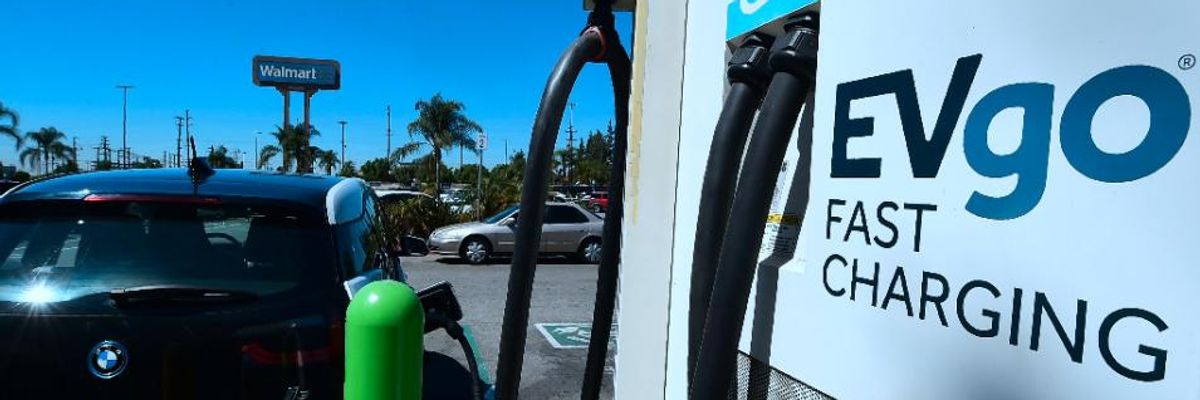A study released Thursday morning by researchers at the University of California, Berkeley finds that declining battery costs and technological advances mean it is possible for all new car and truck sales in the U.S. to be electric by 2035--an achievement that would prevent thousands of premature deaths, bolster the fight against climate change, and save consumers trillions of dollars.
Due in part to high upfront costs relative to internal combustion engine (ICE) vehicles, electric cars currently make up just 2% of all new passenger vehicle sales in the U.S. But the new report projects that prices of light-duty electric vehicles (EVs) "will reach upfront price parity with their ICE counterparts in the mid- to late-2020s."
"These benefits will simply not be realized without ambition and leadership on the part of policymakers and decision-makers."
--David Wooley, U.C. Berkeley
The report further predicts that on a total cost-per-mile basis, electric cars will be cheaper to own than their gasoline-powered equivalents within the next five years.
"The uptake of electric cars and trucks can go much faster than previously forecast and is already exceeding market projections," said Dr. Amol Phadke, senior scientist at U.C. Berkeley's Goldman School of Public Policy. "The performance and cost of the technology are ready to meet the needs of American drivers today, and the necessary charging infrastructure can be built cost-effectively without straining electricity grids."
Echoing past studies stressing the urgent environmental case for electrifying the U.S. transportation sector--the country's largest source of greenhouse gas emissions--the U.C. Berkeley researchers note that "zero-emission vehicles must constitute 100% of light-duty vehicle (LDV) sales no later than 2035 to align with... a safe climate future."
"Political will, policy, and consumer acceptance--not technical or economic feasibility--are the largest barriers to beating these EV sales projections," the researchers argue.
The study estimates that achieving 100% electrification of new car and truck sales "would save consumers $2.7 trillion by 2050, which translates to about $1,000 for every household per year over the next 30 years, and would support a net increase of over two million jobs in 2035."
"Combined with a 90% clean energy grid, electrifying all new car and truck sales would reduce air pollution, prevent 150,000 premature deaths, and avoid $1.3 trillion in environmental and health costs through 2050," the researchers find.
But such a scenario will only be possible if policymakers at the state and federal level take bold action and make adequate investments in charging infrastructure and other areas, the report's authors argue. Just two U.S. states, Massachusetts and California, have pledged to phase out the sale of new gasoline-powered cars by 2035.
In his recently released infrastructure proposal, President Joe Biden calls for the installation of 500,000 EV charging stations across the U.S. within the next decade--a goal analysts say is not nearly ambitious enough.
"What Biden has proposed on chargers is a drop in the bucket," Melissa Lott, an energy policy expert at Columbia University, told The Guardian on Thursday. "We need hundreds of thousands more than that."
David Wooley, professor at U.C. Berkeley's Goldman School and co-author of the new report, said in a statement that "there are significant, economy-wide benefits from switching to electric cars and trucks."
"Many of the health benefits will occur in communities of color and frontline communities that are disproportionately exposed to vehicle pollution," said Wooley. "But these benefits will simply not be realized without ambition and leadership on the part of policymakers and decision-makers."
"Every year America stalls," Wooley added, "our vehicle and battery manufacturing industries fall behind in global competitiveness, consumers are saddled with higher costs, and we miss the ever-narrowing window to address the climate crisis and ensure a livable planet."




